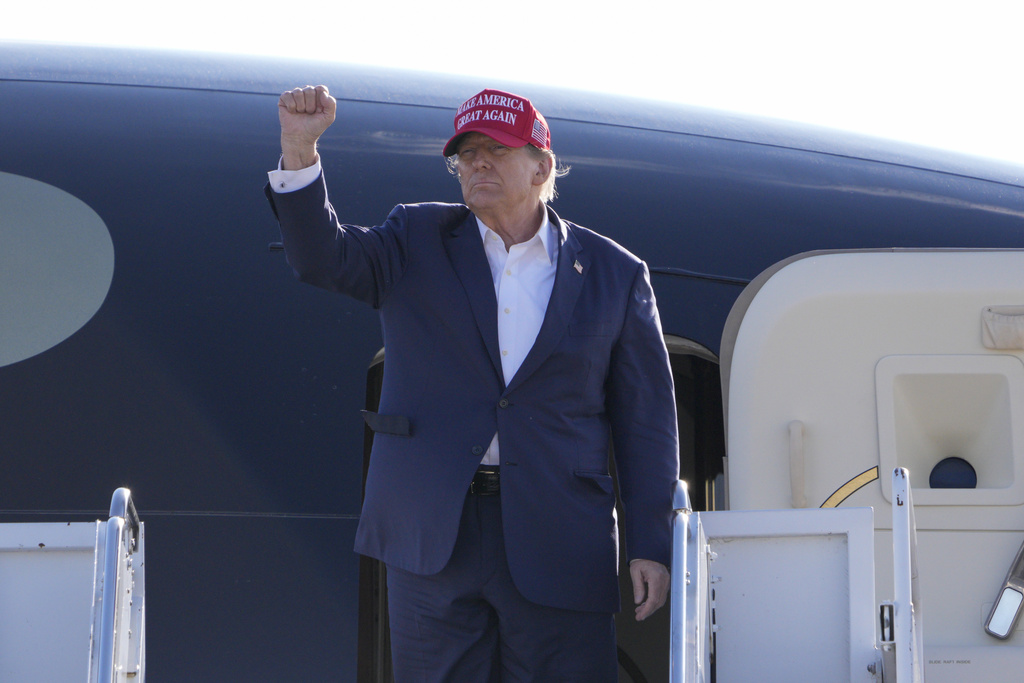Donald Trump’s lawyers told a New York appellate court Monday that it’s impossible for him to post a bond covering the full amount of his $454 million civil fraud judgment while he appeals.
The former president’s lawyers wrote in a court filing that “obtaining an appeal bond in the full amount” of the judgment “is not possible under the circumstances presented.”
With interest, Trump owes $456.8 million. In all, he and co-defendants including his company and top executives owe $467.3 million. To obtain a bond, they would be required to post collateral worth $557 million, Trump’s lawyers said.
A state appeals court judge ruled last month that Trump must post a bond covering the full amount to pause enforcement of the judgment, which is to begin on March 25.
Judge Arthur Engoron ruled in February that Trump, his company and top executives, including his sons Eric and Donald Trump Jr., schemed for years to deceive banks and insurers by inflating his wealth on financial statements used to secure loans and make deals.
Among other penalties, the judge put strict limitations on the ability of Trump’s company, the Trump Organization, to do business.
Trump is asking a full panel of the state’s intermediate appellate court to stay the judgment while he appeals. His lawyers previously proposed posting a $100 million bond, but appeals court judge Anil Singh rejected that. A stay is a legal mechanism pausing collection while he appeals.
A real estate broker enlisted by Trump to assist in obtaining a bond wrote in an affidavit filed with the court that few bonding companies will consider issuing a bond of the size required.
The remaining bonding companies will not “accept hard assets such as real estate as collateral,” but “will only accept cash or cash equivalents (such as marketable securities).”
“A bond of this size is rarely, if ever, seen. In the unusual circumstance that a bond of this size is issued, it is provided to the largest public companies in the world, not to individuals or privately held businesses,” the broker, Gary Giulietti, wrote.
Trump appealed on Feb. 26, a few days after the judgment was made official. His lawyers have asked the Appellate Division of the state’s trial court to decide whether Engoron “committed errors of law and/or fact” and whether he abused his discretion or “acted in excess” of his jurisdiction.
Trump wasn’t required to pay his penalty or post a bond in order to appeal, and filing the appeal did not automatically halt enforcement of the judgment.
New York Attorney General Letitia James, a Democrat, has said that she will seek to seize some of Trump’s assets if he’s unable to pay the judgment.
Trump would receive an automatic stay if he were to put up money, assets or an appeal bond covering what he owes. He also had the option, which he’s now exercising, to ask the appeals court to grant a stay with a bond for a lower amount.
Trump maintains that he is worth several billion dollars and testified last year that he had about $400 million in cash, in addition to properties and other investments.
(AP)












2 Responses
Navalny – US edition.
This can work to Trump’s advantage:
1. If he can’t post bond, once the deadline is passed, then further appeals under New York law are blocked, and he can then appeal to the United States Supreme Court, which might be willing to ban “Lawfare”.
2. Confiscating most of his property for political reasons will strike many people as un-American. It’s something Putin or Xi would do. It suggests the Democrats are opponents of “rule of law” and see law merely as a tool to be twisted into a device to persecute their political enemies.l Trump wants to be able to say that if the powers that be want to seize everything you own because of personal prejudice, whose property is safe.
3, The case is dubious. No one else was ever prosecuted for fraud in a case that no one lost money, and no victims complained – under American law, “fraud” can never be a victimless crime. not to mention that Attorney General who prosecuted the case campaigned on a platform of harassing Trump.